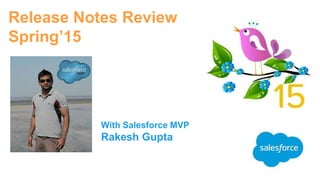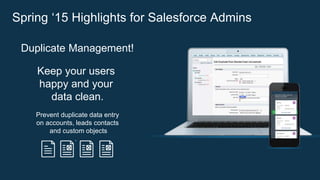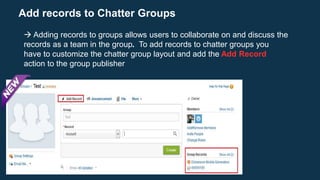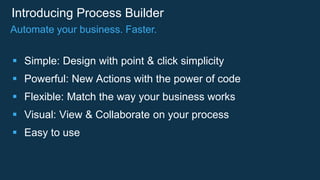Salesforce Spring'15 release overview
- 1. Release Notes Review SpringŌĆÖ15 With Salesforce MVP Rakesh Gupta
- 2. Safe Harbor Safe harbor statement under the Private Securities Litigation Reform Act of 1995: This presentation may contain forward-looking statements that involve risks, uncertainties, and assumptions. If any such uncertainties materialize or if any of the assumptions proves incorrect, the results of salesforce.com, inc. could differ materially from the results expressed or implied by the forward-looking statements we make. All statements other than statements of historical fact could be deemed forward-looking, including any projections of product or service availability, subscriber growth, earnings, revenues, or other financial items and any statements regarding strategies or plans of management for future operations, statements of belief, any statements concerning new, planned, or upgraded services or technology developments and customer contracts or use of our services. The risks and uncertainties referred to above include ŌĆō but are not limited to ŌĆō risks associated with developing and delivering new functionality for our service, new products and services, our new business model, our past operating losses, possible fluctuations in our operating results and rate of growth, interruptions or delays in our Web hosting, breach of our security measures, the outcome of intellectual property and other litigation, risks associated with possible mergers and acquisitions, the immature market in which we operate, our relatively limited operating history, our ability to expand, retain, and motivate our employees and manage our growth, new releases of our service and successful customer deployment, our limited history reselling non-salesforce.com products, and utilization and selling to larger enterprise customers. Further information on potential factors that could affect the financial results of salesforce.com, inc. is included in our annual report on Form 10- Q for the most recent fiscal quarter ended July 31, 2012. This documents and others containing important disclosures are available on the SEC Filings section of the Investor Information section of our Web site. Any unreleased services or features referenced in this or other presentations, press releases or public statements are not currently available and may not be delivered on time or at all. Customers who purchase our services should make the purchase decisions based upon features that are currently available. Salesforce.com, inc. assumes no obligation and does not intend to update these forward-looking statements.
- 3. SpringŌĆÖ15 release notes link HTML Release Notes :- http://goo.gl/9KHSz9 PDF Release Notes :- http://goo.gl/sMIOaz
- 5. Agenda ’é¦ Spring ŌĆś15 for Salesforce Admins! ’é¦ Process Builder Overview! ’é¦ Spring ŌĆś15 for Salesforce Developers! ’é¦ Q&A round
- 6. Spring ŌĆś15 Highlights for Salesforce Admins Keep your users happy and your data clean. Prevent duplicate data entry on accounts, leads contacts and custom objects . Duplicate Management!
- 7. Duplicate Management! ’āĀ Duplicate rules donŌĆÖt run when records are created in following ways. ŌĆó When records are created using Quick Create. ŌĆó When leads are converted to accounts or contacts and your organization doesnŌĆÖt have the ŌĆ£Use Apex Lead ConvertŌĆØ permission. ŌĆó When a record is restored with the Undelete button. ŌĆó When records are added using Exchange Sync. ŌĆó When records are manually merged
- 9. Add records to Chatter Groups ’āĀ Adding records to groups allows users to collaborate on and discuss the records as a team in the group. To add records to chatter groups you have to customize the chatter group layout and add the Add Record action to the group publisher
- 10. Emoticons Added in the Feed ’āĀ Now your users can add expressions like a smiley face to their posts and comments by typing a character combination. To enable/disable this feature follow the path Setup | Build | Customize | Chatter | Settings and select ŌĆ£Allow EmoticonsŌĆØ checkbox. Emoticons arenŌĆÖt supported in Salesforce1.
- 11. Feed with a New Task Action ’āĀ It allow users to create New Task action directly from a post in their feed.
- 12. Subscribe to Receive Report Notifications ’āĀ After SpringŌĆÖ15 release users can now sign up for report notifications, to stay up-to-date on the metrics they care about most. To subscribe a report click on subscribe button and the conditions, action and schedule frequency. Each user can subscribe to up to five reports.
- 13. Add Rich Text Notes to Records ’āĀ Now with Notes, users can add bulleted and numbered lists to notes. User have option to follow the notes and share it with ŌĆ£PeopleŌĆØ or ŌĆ£Chatter GroupsŌĆØ(As shown in the following screenshot). To enable/disable this feature follow the path Setup | Build | Customize | Notes | Settings and select ŌĆ£Enable NotesŌĆØ checkbox.
- 14. Add Public Groups to delegated administrator ’āĀ Now delegated administrators can create public groups, and you can specify public groups in which delegated administrators can add and remove users in specified roles and all subordinate roles..
- 15. ’é¦ Drive Salesforce1 Adoption ’é¦ Guide Sales reps through your companyŌĆÖs sales process. ŌĆō Provide links to Chatter posts ŌĆō Helpful information ŌĆō best practices ŌĆō potential pitfalls ŌĆō words of encouragement Sales Path
- 16. Assets Object Redesigned as a Standard Object ’āĀ The Assets object is used to tracks products that your customers own. The Assets object has been enhanced in SpringŌĆÖ15 release to give your users a more robust way to manage assets. Previously, the Assets object was a child object of the Accounts object. After SpringŌĆÖ15 release the Assets object has been redesigned as a standard object and has the same features, including a tab, sharing settings and record types, as a standard object.
- 18. Introducing Process Builder ’é¦ Simple: Design with point & click simplicity ’é¦ Powerful: New Actions with the power of code ’é¦ Flexible: Match the way your business works ’é¦ Visual: View & Collaborate on your process ’é¦ Easy to use Automate your business. Faster.
- 19. Process Builder Next Generation Workflow Multiple ŌĆ£RulesŌĆØ in 1 process More Flexibility Graphical Interface Workflow Rules New Actions
- 20. Process Builder SpringŌĆÖ15 ’é¦ Create version of a Process ’é¦ Call an Apex method from Process ’é¦ Trigger a Process Multiple Times in a Single Transaction ’é¦ Submit For Approval Through Process
- 21. Visual Workflow Spring 15ŌĆÖ ’é¦ Pause and Resume ’é¦ Customize Condition Logic in Flow ’é¦ Create a Dynamic Label for Flow Interviews ’é¦ Invoke Apex from a Flow ’é¦ Launch a Flow from Salesforce1 (Pilot) ’é¦ Reference the ID of a Chatter post That a Flow created ’é¦ New Attributes for <flow:interview> allowShowPause
- 22. Developer
- 23. Field Audit Trail (GA) Declarative, Policy Driven Retention LIVE ARCHIVE
- 24. Field Audit Trail (GA) APIs SObject ŌŚÅ All history goes into the EntityHistory SObject initially, cannot live there > 18 months ŌŚÅ Policy describes retention to allow Field History for up to 18 months in SObject storage and to be retained in FieldHistoryArchive BigObject for up to 10 years. ŌŚÅ No field history tracking limits permitted above default of 20 fields without Policy and Field Audit Trail add-on in place. ŌŚÅ Use Salesforce Metadata API to define a retention policy for your field history. Then use REST API , SOAP API , and Tooling API to work with your archived data. BigObject
- 25. Field Audit Trail Record Retrieval FieldHistory Archive Accounts Cases Contacts Opportunities Custom Leads APISOQL
- 26. #forcewebinar ArchiveFieldName ArchiveParentName ArchiveTimestamp 1 Amount Acme - 2 Widgets 2014-12-12T05:00:35.213Z 2 NextStep Acme - 2 Widgets 2014-12-12T05:00:35.214Z 3 Custom_Checkbox Acme - 2 Widgets 2014-12-12T05:00:35.214Z 4 Custom_Currency Acme - 2 Widgets 2014-12-12T05:00:35.214Z SELECT ArchiveFieldName,ArchiveParentName,ArchiveTimestamp FROM FieldHistoryArchive SOQLResponse Field Audit Trail Queries
- 27. Field Audit Trail (GA) with Archive 1. Standard Offering ŌŚŗ 20 fields/objects ŌŚŗ Retention for only 18 months 1. Field Audit Trail Add-on ŌŚŗ Up to 60 fields can be tracked ŌŚŗ Retention the audit trail for up to 10 years Field History retention is defined as the number of months after which it should be archived into the FieldHistoryArchive object and how long the data should be retained for.
- 28. Set Up Test Data for an Entire Test Class ’āĀ You can reduce test execution times especially when youŌĆÖre working with many records. Test setup methods enable you to create common test data easily and efficiently. By setting up records once for the class, you donŌĆÖt need to re-create records for each test method. If a test class contains a test setup method, the testing framework executes the test setup method first, before any test method in the class. Records that are created in a test setup method are available to all test methods in the test class and are rolled back at the end of test class execution. @testSetup static void methodName() { }
- 29. #forcewebinarChallenge Yourself! http://developer.salesforce.com/trailhead ŌĆó Interactive learning paths ŌĆó Earn badges and points ŌĆó Declarative and Programmatic BRAND NEW! Introducing Trailhead
- 30. One Click Update (http://goo.gl/cLH5WN) By Satrang Technologies ’āĀ This app allows you to quickly update records with just one click. Without clicking on Edit or Save button, Picklist fields can be edited & updated in just one click. Easy and efficient app for everyone including Sales and Customer Service reps.
- 31. Q&A
- 32. Thank You
































